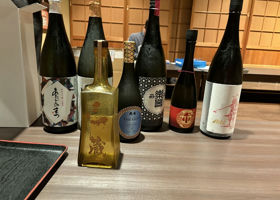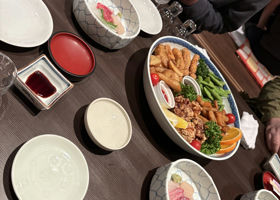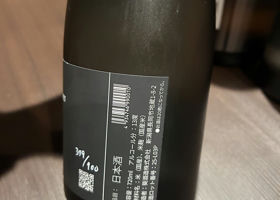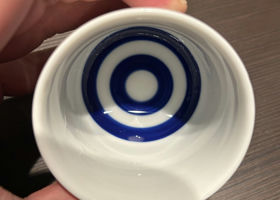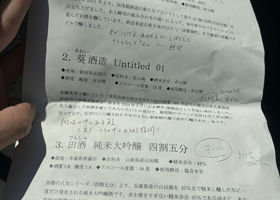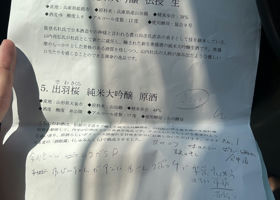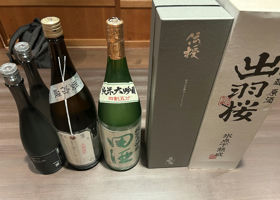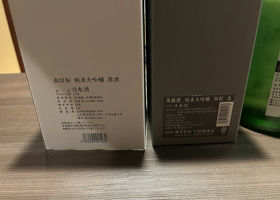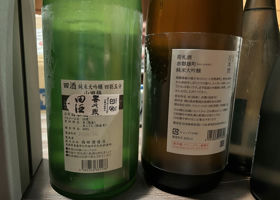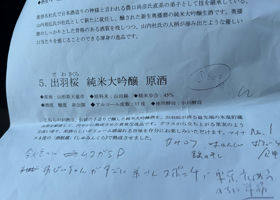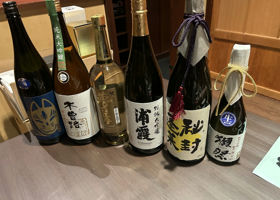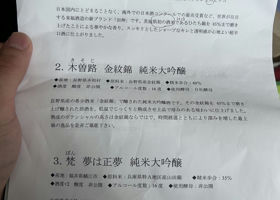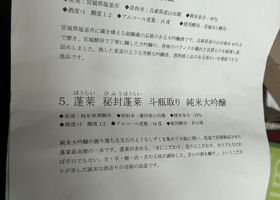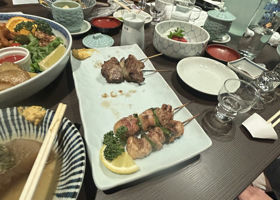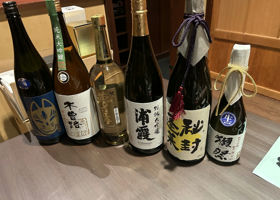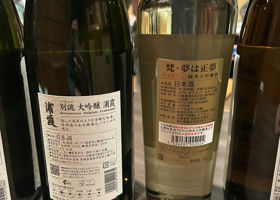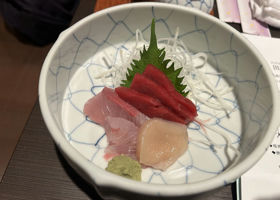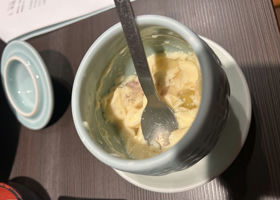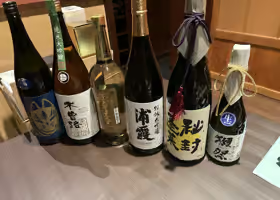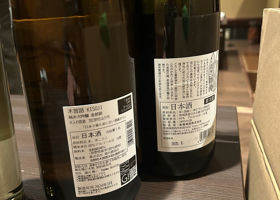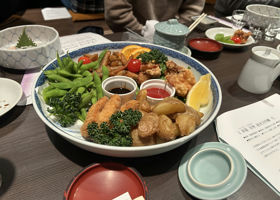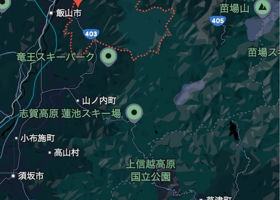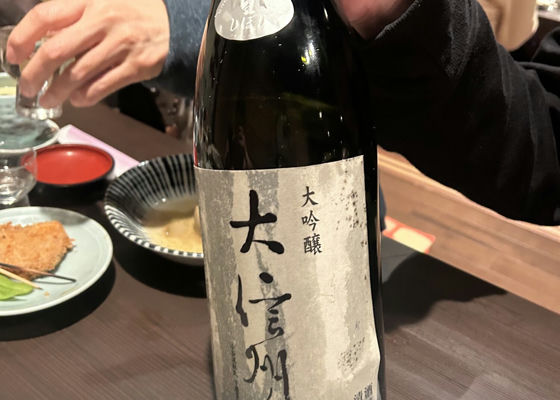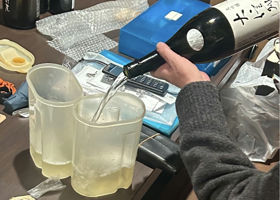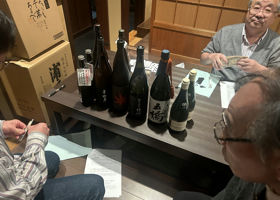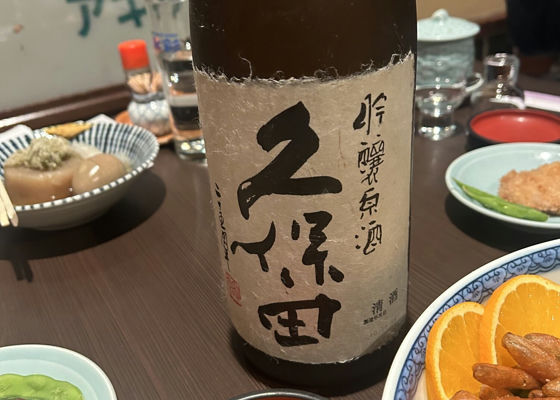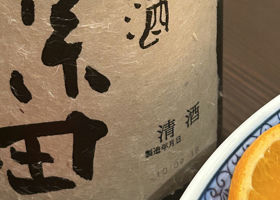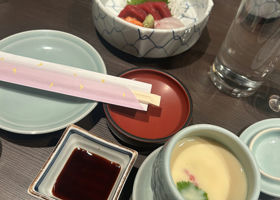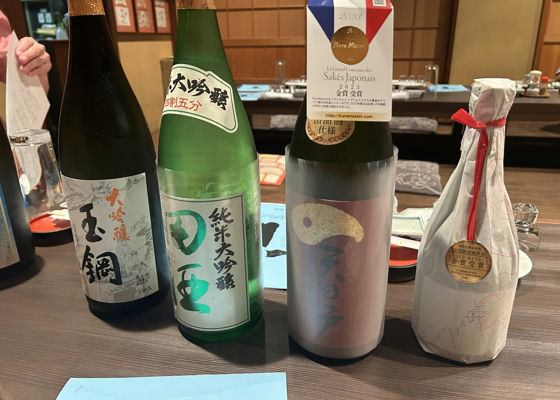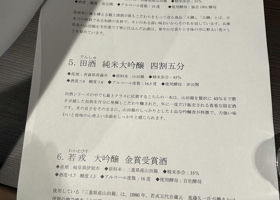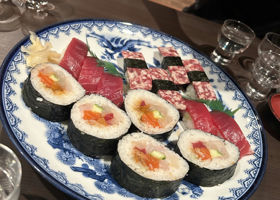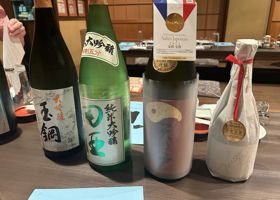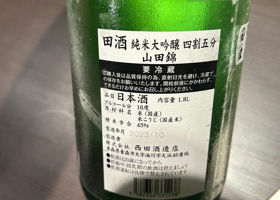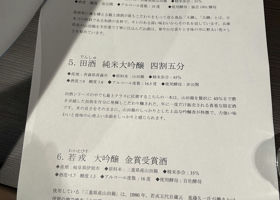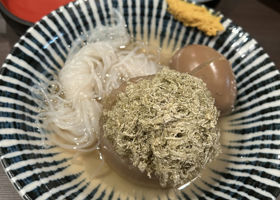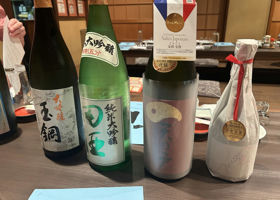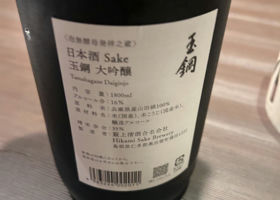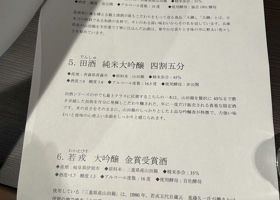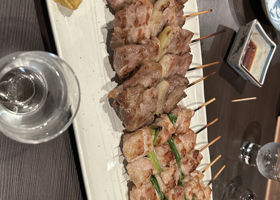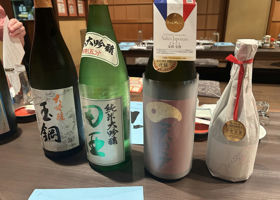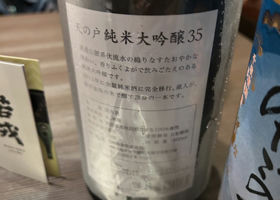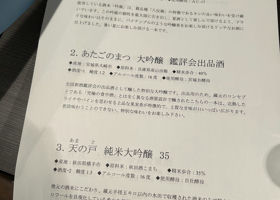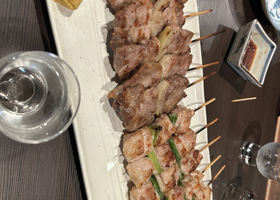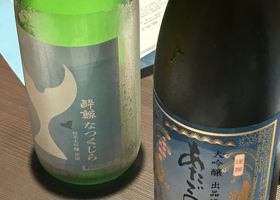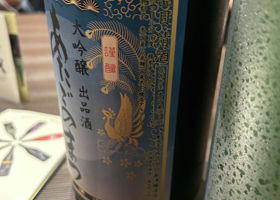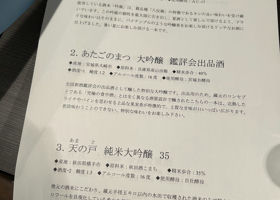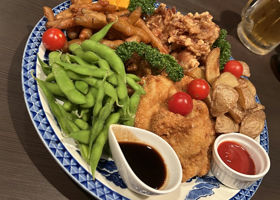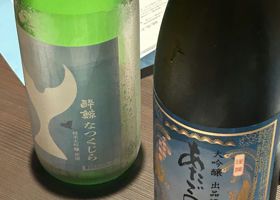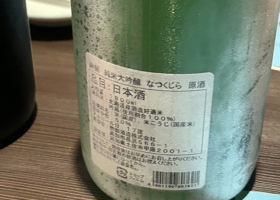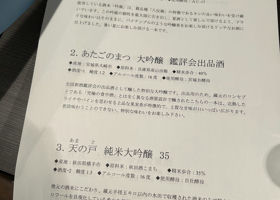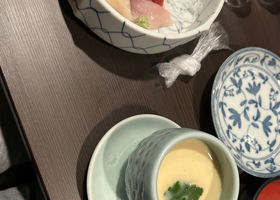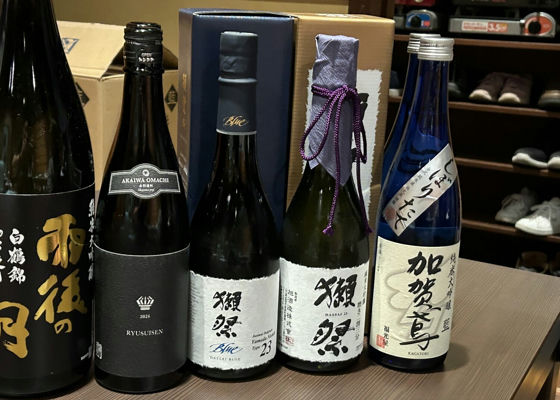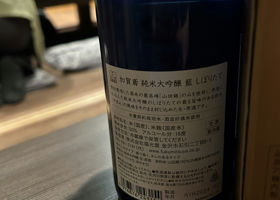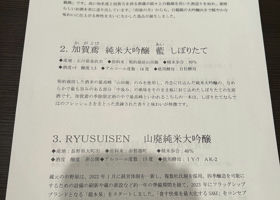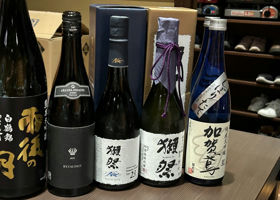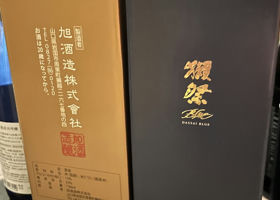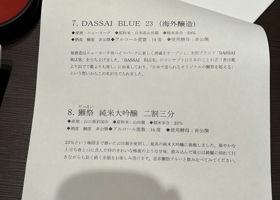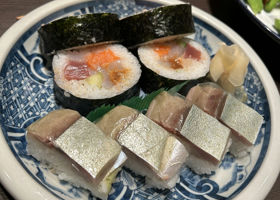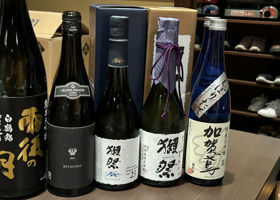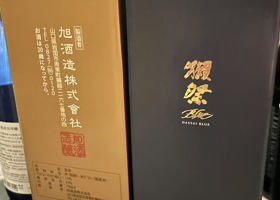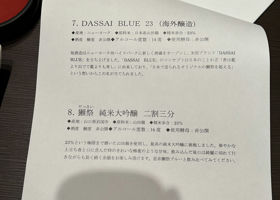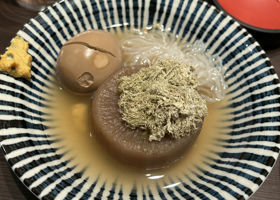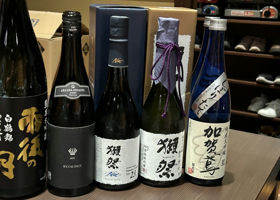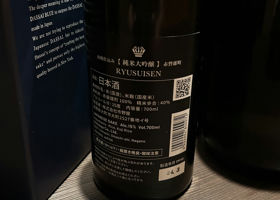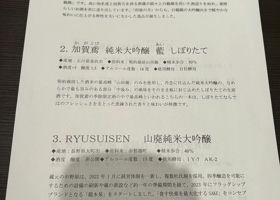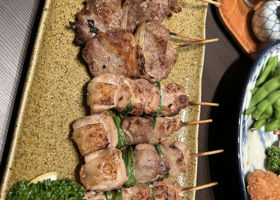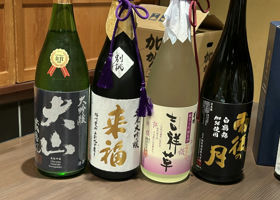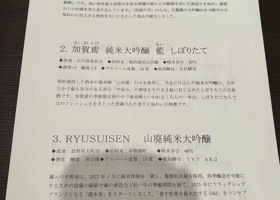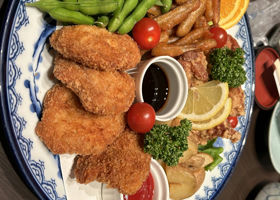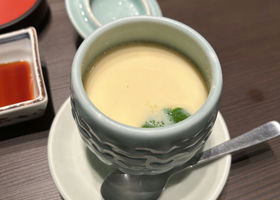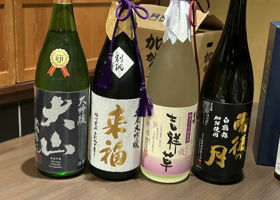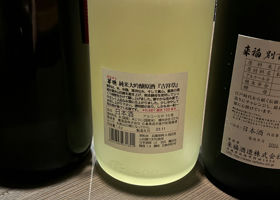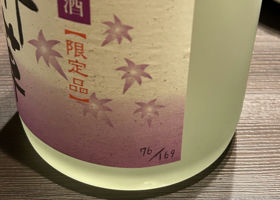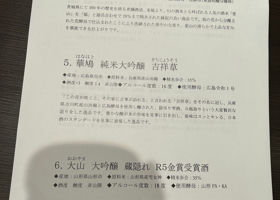Timeline
酔生夢死⭐️ President and Daigin Kai
Akabu, what is ice cold pressing?
Warming by hand changes the expression
Drunken garden delicious, ripeness and Yoshikawa Yamada
Aroma not like Daishichi
Tasake 4-digit yeast? Aftertaste is heavy, but it goes down fast.
Taste has to be tight to be tasty
🟥Then individuality, lingering aftertaste 酔生夢死vocal recital
⭕️Acid in (behind) miscellaneous flavors
Technique of keeping it within the mold → good sake
Wine stays on the tongue → marriage
Sake is volatile → food sake
Non-spec is remarkable ‼️ 酔生夢死vocal recital
Sake Degree
+2
Acidity
1.4
Alcohol content
17 degrees Celsius
Rice used
100% Yamadanishiki
Polishing ratio
45% (with a minimum of 2,000 ppm of molten rice)
Yeast used
Ogawa yeast
⭕️ Sweetness richness, acidity sharpness
A voluminous yet food-friendly sake Dassai磨き二割三分 元旦届け純米大吟醸原酒生酒中取り無濾過 酔生夢死Daigin-kai with the president 🍶.
Since it was a gift from the president
Toast sake not on the list
Classy and gorgeous✨
Rice used: Yamadanishiki
Polished 23
Designated Sake, etc. Junmai Daiginjo/nama-shu
16% alcohol by volume 酔生夢死Daigin Kai with the President🍶.
Even in this terrific lineup
The aftertaste is by far the longest and smoothest ‼️
Aged for more than 5 years at minus 8 degrees Celsius.
Junmai Daiginjo-shu with a 20% milling ratio and Junmai Daiginjo-shu with a 35% milling ratio are blended at a ratio of 9:1 just before shipping.
Rice: Yamadanishiki ■Polishing ratio: 35% ■Alcohol level: 16% ■Sake alcohol level: +2.0 酔生夢死Daigin Kai with the President🍶.
Yukawa Sake Brewery was founded in 1650, in the early Edo period. It has the second oldest history in Nagano Prefecture.
It is said that Kijimadaira has always been famous for its Kinmon-nishiki 🧐.
at this meeting🥇🍶.
Unique sweetness and
Softness that you can drink all the time ⭕️
It was my first Kisoji, but
It was the brewery that brews Kuroemon 🧐.
Kinmon-nishiki rice produced in Yaebaru, Nagano, Japan
Contract rice cultivated by Taiyo to Daichi Co.
Rice polishing ratio 40
Alcohol content: 15% (Unpasteurized) 酔生夢死Daigin Kai with the President: ‼️
Manufactured in 2000
No details
To be decanted🍶. 酔生夢死Daigin Kai with the President: ‼️
Manufactured September 2010
Alcohol content: 18
Rice Source : Gohyakumangoku
Rice Polishing Ratio : Koji rice 50%, Kake rice 55 酔生夢死vocal recital
Rice: Yamadanishiki produced in Mie Prefecture
Polishing ratio: 35
◆Sake meter: -1.7 Acidity: 1.3 ◆Alcohol level: 16% ◆Yeast: In-house yeast
The "Yamada-Nishiki produced in Mie Prefecture" used in this sake was created in 1986 when Hisakazu Shigeto, the fifth generation brewer of Wakabisu, revived the "Yamada-Nishiki" sake rice in the Iga region.
Gizaemon, named after the founder, is the brewery's representative sake. 酔生夢死vocal recital
◆Rice: Yamadanishiki ◆Polishing ratio: 45
Sake degree: Sat. 0 Acidity: 1.6
◆Alcohol percentage: 16.5
This bottle, which is one of the top class in the Tasake series, is a valuable limited edition sake sold only once a year. 酔生夢死Daigin Kai
This meeting my best ‼️
Can't take your hand off the boar cup
Unique bluishness and sharpness
You'll want another sip soon‼️
Raw material rice: Yamadanishiki from Hyogo Prefecture
Polishing ratio: 35
◆Acidity: Undisclosed
Alcohol percentage: 16%.
Yeast used: Association 1801 yeast
TAMA-NABE" is the most particular product made by Tekkami Seishu, which is located in Shimane Prefecture, Japan. Tamanabe" is the name of Japanese iron used to make Japanese swords, and it is named after its sharp and deep taste. 酔生夢死vocal recital
◆Rice: Akita Sake Komachi ◆Polishing ratio: 35
Sake strength: -2 Acidity: 1.5
Alcohol percentage: 16
◆Yeast used: In-house yeast
This is a rare and renowned brewery that embodies the terroir, using only sake rice harvested from rice paddies within a 5-kilometer radius of the brewery. 酔生夢死vocal recital
The sake is designed for exhibition and has a completely different sake quality from the "ultimate food sake" concept of the brewery.
Rice polishing ratio 40
Sake degree -1
Acidity 1.2
Amino Acidity 1.2
Alcohol content 17
Rice used: Domestic rice
Yeast used: Miyagi B yeast 酔生夢死vocal recital
Type Junmai Daiginjo-shu
Original rice: Ginpu (Hokkaido)
Polishing ratio 50%.
Holding temperature 5˚C or less
Alcohol content 17
Sake degree 7
Acidity 2.0
Amino acidity 1.3
Ginpu" is a rice suitable for sake brewing grown only in Hokkaido. It inherits the crisp flavor characteristic of its parent variety, Hachitan-Nishiki.
Kochi yeast "AC-17 酔生夢死Daigin Kai (8)
Toast Sake
The volume of freshly pressed sake
◆Production area: Kanazawa city, Ishikawa pref.
Rice: Yamadanishiki grown under contract; Polishing ratio: 50%.
Sake meter degree: +5, Acidity: 1.5, Alcohol level: 16%, Yeast used: In-house yeast
This is a freshly squeezed, unpasteurized sake made using only the highest grade of sake rice, Yamadanishiki, which is grown under contract, and carefully brewed. This bottle is said to be the best of Kagatobi's seasonal sake, and is characterized by its refined aroma and taste covered with the freshness that only freshly pressed sake can offer. 酔生夢死Daigin Kai (7)
Brilliance, Yamada sweetness, lingering taste
Calculated perfect balance ⭕️
Many people say it is "quintessential
◆Production area: Iwakuni-shi, Yamaguchi ◆Rice: Yamada-Nishiki ◆Polishing ratio: 23
◆Acidity: Not disclosed ◆Alcohol: 15% ◆Yeast: Not disclosed
Using Yamadanishiki polished to the limit of 23%, we challenged ourselves to make the best Junmai Daiginjo. It has a gorgeous heady aroma, a beautiful honey-like sweetness on the palate, and a long, lingering aftertaste that finishes cleanly after swallowing. 酔生夢死Daigin Kai (6)
The highlight of the event, Otter 23 drinking comparison: ‼️
It's just a little bit, but it's not hard.
It was a little bit hard, but it was firm or thicker.
It has a lower alcohol content compared to domestic sake.
Is it balanced in terms of drinking comfort?
Provenance: New York
Rice: Yamadanishiki from Japan Polishing ratio: 23
◆Acidity: Undisclosed ◆Alcohol: 14% ◆Yeast used: Undisclosed
Asahi Shuzo has opened a new brewery in Hyde Park, New York and launched the U.S. brand "DASSAIBLUE". The concept of "DASSAI BLUE" is derived from the Japanese proverb "Blue is more blue than indigo", and the name was chosen to "surpass the original Otter made in Japan". 酔生夢死Daigin Kai (5)
The sense of Omachi is more mature than the image
Dry impression
As a fan of Omachi, I want it to be more assertive. ‼️
◆Production area: Omachi-city, Nagano pref.
Rice: Akaban Omachi, Polishing ratio: 40
◆Acidity: Not disclosed ◆Alcohol: 15% ◆Yeast: 1Y-7 AK-2
Kura no Ichinoya renewed its management structure in January 2022 and adopted a multi-toji system. After about a year of preparation, including renewal of facilities and construction of a new brewery to enable seasonal acid production, the flagship brand "Ryusuisen" was launched in 2023. Under the concept of "SAKE that maximizes the pleasure of eating," we are brewing sake that is more food-friendly, regardless of the genre of Japanese, Western, or Chinese cuisine. 酔生夢死Daigin Kai (4)
Chawanmushi (steamed egg custard) we had at this time was delicious~‼️
Place of Origin: Kure City, Hiroshima Prefecture
Rice: Hakutsuru-Nishiki produced in Hiroshima
Polishing ratio: 48
Sake meter reading: 1.4
Alcohol percentage: 16
Yeast used: Association No. 901
Hakutsuru-nishiki is a sake rice originally developed by Hakutsuru Sake Brewery to surpass Yamadanishiki, the king of sake rice. Sake breweries that boast of their high name recognition and technological prowess have begun using Hakutsuru-Nishiki to make sake, and are producing excellent sake. 酔生夢死Daigin Kai (3)
The only one in the lineup? The only one in the lineup?
The calm and smoldering Ginjo ⭕️
This is the best one to drink all the time: ‼️
I knew it was limited to 169 bottles.
The lot number is handwritten on the lower right corner of the label.
Place of origin: Kure City, Hiroshima Prefecture
Yamadanishiki from Hyogo Prefecture
Polishing ratio: 35
Sake meter: +3, Acidity: 1.4, Not disclosed
Alcohol percentage: 16
◆Yeast used: Hiroshima 2019
This sake is named after "Kissho Grass" which is said to bring good luck to the house when this flower blooms.
It is a very luxurious product made with Yamada-Nishiki produced in Yoshikawa-cho, Hyogo Prefecture and Hiroshima yeast. The rich acidity brings out the umami of the rice and the finish is crisp and clean, a perfect expression of the standard of sake. RecommendedContentsSectionView.title
